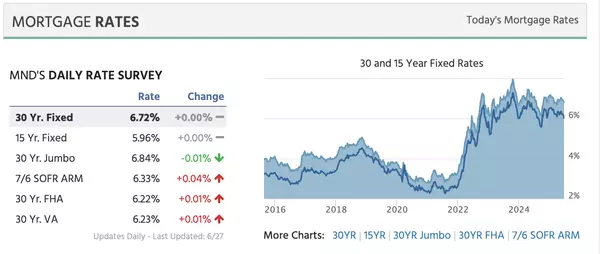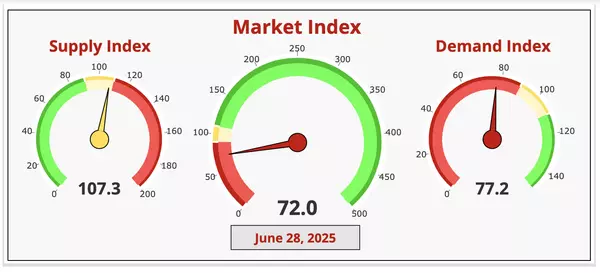The Truth About Real Estate Seasonality in Phoenix: When Is the Best Time to Buy or Sell?
Phoenix has long been a real estate hotspot, known for its steady population growth, strong job market, and desirable climate—especially in the cooler months. But one question always comes up for both buyers and sellers: Does seasonality matter in the Phoenix real estate market? And what role do snowbirds play in market trends? Let's break it down.
Understanding Seasonality in Phoenix Real Estate
Unlike other parts of the country where winter brings a slowdown in home sales, Phoenix operates under a different set of rules. With its warm winters and scorching summers, the traditional patterns of real estate seasonality take on a unique shape.
Peak Season (October–April)
This is when the Phoenix market sees an influx of activity, particularly from out-of-state buyers and second-home seekers. Many of these buyers, often referred to as "snowbirds," flock to Arizona to escape harsh winters elsewhere. This seasonal demand can lead to:
-
Higher home prices due to increased competition.
-
Quicker sales as buyers make swift decisions to secure their winter retreats.
-
Increased rental demand, especially in 55+ communities and vacation-friendly areas like Scottsdale, Mesa, and the East Valley.
Slower Season (May–September)
Summer in Phoenix is intense, and as temperatures rise, real estate activity tends to cool down. However, this doesn’t mean the market grinds to a halt. In fact, the slower season offers unique advantages:
-
Less buyer competition, allowing for better negotiating power.
-
Potentially lower home prices, as sellers who list in summer may be more motivated.
-
Easier scheduling for home tours, as fewer buyers are out house-hunting in triple-digit heat.
The Snowbird Effect: Boon or Burden?
Snowbirds—seasonal residents who typically come from colder climates—play a significant role in shaping Phoenix’s real estate market. Their impact can be both positive and challenging, depending on your perspective.
The Pros of Snowbirds in Phoenix Real Estate:
✅ Increased demand for homes, especially in winter-friendly communities.
✅ Boost to the rental market, providing income opportunities for local landlords.
✅ Economic growth, as snowbirds contribute to local businesses, restaurants, and services.
✅ Property value stability, as many seasonal residents invest in well-maintained second homes.
The Cons of Snowbirds in Phoenix Real Estate:
❌ Inflated seasonal pricing, which can make it harder for full-time residents to buy in winter.
❌ Market fluctuations, with high demand in winter and slower sales in summer.
❌ Temporary economic reliance, as some areas experience revenue dips when snowbirds leave.
❌ Limited rental inventory, as seasonal visitors drive up demand (and costs) for short-term rentals.
So, When Is the Best Time to Buy or Sell in Phoenix?
-
If you're buying, consider shopping in the summer when competition is lower, and prices may be more negotiable.
-
If you're selling, winter and early spring can maximize your home's exposure to out-of-state buyers willing to pay a premium for the Arizona lifestyle.
-
If you're an investor, understanding the seasonality can help you time purchases strategically, whether you're targeting long-term rentals, short-term vacation properties, or resale opportunities.
Final Thoughts
While seasonality does play a role in Phoenix real estate, it’s not as pronounced as in colder climates. The city’s year-round demand, fueled by ongoing population growth and economic expansion, ensures a relatively steady market. However, understanding the ebb and flow of seasonal trends—and the impact of snowbirds—can help buyers, sellers, and investors make smarter, more strategic decisions.
Whether you're looking to make a move now or in the future, staying informed about the market is key. If you need expert advice on buying, selling, or investing in Phoenix real estate, I’d be happy to help!
Categories
- All Blogs (53)
- 4x4 (1)
- Adventure More (2)
- airpark (3)
- arcadia (34)
- AZ Reatlor (13)
- BINSR (3)
- booming (13)
- brokerages (10)
- building (27)
- buyer's agent (18)
- Buyer's Market (2)
- camelback (25)
- commissions (5)
- Concessions (4)
- Dad Life (1)
- desert living (35)
- Due Diligence (5)
- first time (9)
- first time home buyer (18)
- Get Dirty (3)
- Go Fast Don't Die (3)
- home gym (2)
- Home Inspection (5)
- home ownership (30)
- investing (26)
- jobs growth (13)
- jobs report (12)
- Left Lane (3)
- Let Me Live My Best Life (6)
- local economy (23)
- luxury (28)
- luxury living (29)
- Market Updates (2)
- nar (6)
- National Housing Market (1)
- neighborhood (21)
- new chapter (9)
- Off-Road (2)
- Paradise Valley (3)
- Phoenician (20)
- Phoenix Living (23)
- Phoenix Realtor (14)
- population (6)
- pump it up (1)
- real estate (30)
- Repairs (2)
- Scandinavian (1)
- Scottsdale (10)
- Scottsdale Living (24)
- Scottsdale Realtor (12)
- Seller Disclosure (2)
- Snowbirds (6)
- starting out (3)
- Stay Updated (1)
- The Great Outdoors (3)
- Time is Money (6)
- Trends (1)
- Well Researched (1)
- Winter Travelers (4)
Recent Posts










GET MORE INFORMATION

